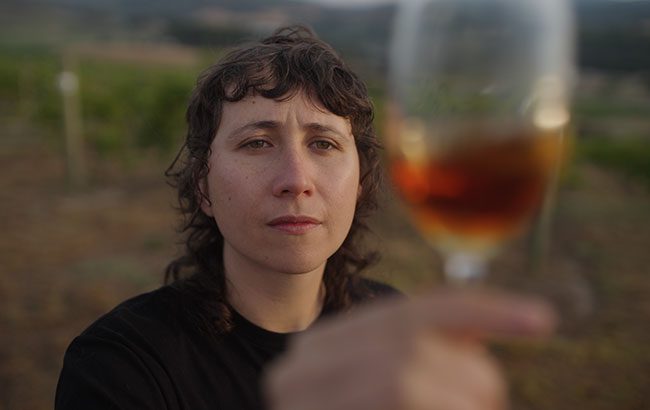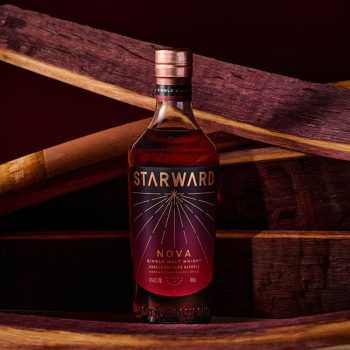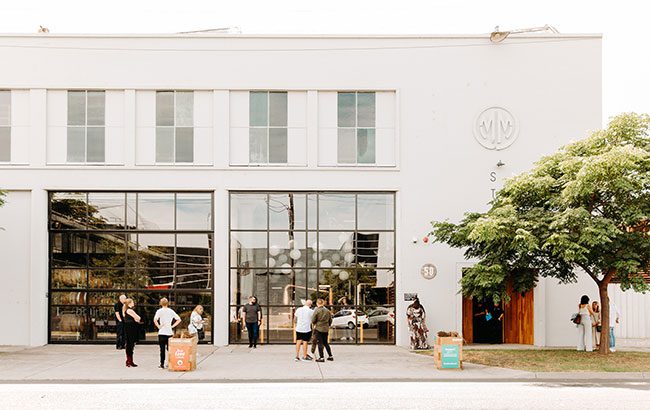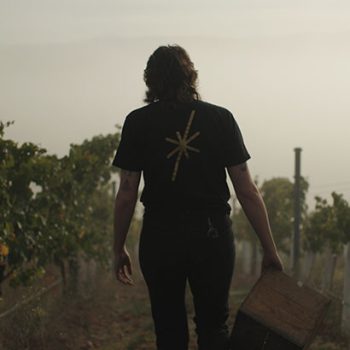The big interview: Carlie Dyer, Starward
Having started out in the wine industry, Carlie Dyer moved across to Australian whisky producer Starward, where she is head distiller and head blender. She tells The Spirits Business how she approaches distilling through a wine lens.

*This interview was originally published in the November 2025 issue of The Spirits Business magazine.
When Carlie Dyer moved from New Zealand to Australia at 19, her intention was to work in vineyards to earn money between semesters at university. A keen musician at school, Dyer opted to study audio engineering in an admittedly panicked, post-high school “I need to study something” decision. However, what started as a casual, seasonal job in the wine industry soon developed into a serious career pursuit.
“I realised that I was more interested in making wine and working in the wine industry than audio engineering,” Dyer recalls. “That led me to work in Australia in the wine industry for seven to nine years, mainly as a lab technician for Casella Wines. I then had a job in the Yarra Valley, working as a lab manager at De Bortoli, and I also worked in the cellar.”
Dyer was familiar with Starward, the then up-and-coming Australian whisky distillery. When a job became available at the distillery, her interest was piqued. “I was intrigued by them. When I started in 2018, there weren’t as many whisky distilleries as there are now. There has been a big boom in the past five to seven years,” Dyer says.
“The great thing about Starward is most of what we do is wine cask maturation. So, all my skills from the wine industry translated to Starward. I just had to learn to distil, and that was a fun new thing to learn.”
Lab experience
In the early days of her career at Starward, Dyer was more quality-based, thanks to her lab experience, before “naturally moving into distilling for a year, then being a blender for five, and then I became head distiller and head blender last year”. Dyer had studied oenology (the study of wine) during her time at the wineries, and went on to complete the general certificate in distilling (GCD), and is currently in the midst of achieving the IBD diploma in distilling.

“Since the 1990s when Lark started back up, we [Australian distillers] drew from other industries, like wine and beer, because there wasn’t that distilling experience here like there was in Scotland,” Dyer explains. “So, my wine experience really transferred well. And the good thing with Starward was a lot of us were brewers or ex-wine, and at those early stages of making whisky in Australia, I feel like we were all learning it together. Now, the Australian whisky industry is looking really good.”
So good, in fact, that this year, a parliamentary inquiry was encouraged to create an Australian spirits trade body, called Spirits Australia, comparable with the country’s model for wine. Titled Inquiry Into Food and Beverage Manufacturing in Australia, the inquiry came from the nation’s food and drinks producers, in a bid to unlock a predicted AU$1 billion (US$650 million) export potential.
Dyer credits older Australian whisky distillers for paving the way for newer producers to flourish. “The ones that established Australia have really helped to foster the younger distillers in Australia. At Starward, we encourage smaller distilleries to come through, and we often have safety training and excise training, and at our distillery that is done by the Australian Distillers Association. “Since it started in 2009, and as a community, Starward has talked about all the phases that we go through as an industry because we’re not competing against one another. We want to be able to export and be a global whisky. That’s most people’s mentality.”
Starward has certainly made a name for itself in its home market and overseas in recent years. Dyer believes part of what makes the brand successful and appealing is its relationship with the wine industry. She says: “Sourcing local ingredients is also a big appeal. Our malts are grown an hour out of Melbourne, our barrels are all sourced within a day’s drive of Melbourne. Our climate is also a distinctive factor.”
This latter point is tricky to work with, Dyer notes. “It’s challenging, that’s definitely true,” she says. “We will see summers around 40 degrees [Celsius] outside, maybe up to 44°C in extreme temperatures. Our bond stores are just corrugated iron. There’s no cooling or anything like that, so the temperature inside is often five to 10 degrees hotter than the outside temperature, depending on how high the barrels are. So, we do have a really big angel’s share and very, very fast extraction.”
Whisky aged in red wine barrels that were filled without being shaved, charred and toasted are typically ready in two-and-a-half to three years, Dyer says. “We do shave, toast and char some of our barrels, which we’ll usually do in a bigger format so that the extraction of the wood doesn’t overpower the fruit of the spirit,” she adds. Examples of cask experimentation from Starward over the years include a single malt whisky finished in ex-Lagavulin barrels, and another limited edition release, aged for 18 months in stout barrels.
One of the most recent pieces of innovation, however, has been Starward’s Co-Ferment project. It’s yet another part of the cross-pollination of wine and whisky making, and started in 2018. “We were unsure of how consumers would perceive it because it’s not a whisky, or a sort of a brandy or wine. It’s two things [malted barley and pressed grapes] co-fermented together, and they’re distilled and matured together,” Dyer explains. “Technically, under Australian alcohol categories, it’s a ‘spirit drink’, which isn’t very sexy, but there’s room for exploring other categories or cross categories.”

It’s a fine balancing act knowing when to plough on with innovative experimentation and when to stick to more tried-and-tested methods and flavour profiles. “When you start to play in the realm of alternative wine varietals, casks, and something like Co-Ferment, you really have to invest in spending time on educating consumers and bartenders,” Dyer says. “With Co-Ferment, we led with the story and we did some really good visuals to create intrigue. We left the technical spirit category in the background. It can fall flat on its face; it’s risky. One thing we really try to do at Starward is have local, national and international bartenders come through and give them an experience, taking time through the making process and explain our story.” This, Dyer believes, has been crucial to helping Starward share its story and purpose, and create connections in the industry and beyond. This is something both Dyer and the wider Starward team feel committed to continuing.
Distillation parameters
It has been just over year since Dyer was named head blender and distiller for Starward. During those initial 12 months, a focal point has been looking at “narrowing all of our distillation parameters to make sure that we were making a really good spirit that was within our style”. She continues: “A big focus for me was looking at the wash and the spirit that we make daily with the distillers. We do sensory panels and get some chemical analysis as well. It’s important if you can to look at almost every ferment and distillation, even if it’s just briefly.”
Another area Dyer has been focused on is sharpening and calibrating everyone’s senses to be able to decipher “this is what banana smells like in our wash, or this is what pineapple smells like in our wash”.
“Senses are definitely a big thing I find really fascinating, particularly in spirits, and I suppose I’ve always been about making sure the team is cohesive as well,” Dyer explains. “But I’m also blending too. I guess I’m touching the spirit from every aspect, from raw materials all the way to the packaging line. It’s a big job, but if you make a really good spirit, and it’s in a certain parameter, you’re going to get a good whisky at the end of the day.”

It’s evident Dyer is eager to keep learning and growing as a distiller and blender, even with all the expertise she has already gained. She notes some incredible women she looks up to in the whisky industry, who have inspired her and helped to shape Dyer’s approach to whisky making.
“I’ve always been a big fan of Rachel Barrie [master blender and senior leader at Brown-Forman], her resumé is insane,” Dyer says. “She’s got so much knowledge, and I’ve been to two tastings by her for Glenglassaugh and Benriach – they were phenomenal. I’ve had mentorship from Jayne Lewis, who started a brewery called Two Birds, a really cool, women-founded brewery in Melbourne. That’s something I’m seeing in Australia too, the mentorships and how beneficial that is for everyone in the spirits industry.”
One goal for Dyer in the near future is to return to Scotland for the 2026 Worldwide Distilled Spirits Conference, to not only improve her own technical knowledge but remain connected to what’s happening in the wider whisky world. “I definitely want to make sure I have a broader idea of what’s happening in the industry,” Dyer says.
“It’s really important to be on top of products that are coming out from other distilleries, to educate yourself on new innovations, ferments, and sustainability to keep growing. I’m very well learned in production processes, so I’d like to broaden my horizons with sales, marketing and the trade. I just love learning. I don’t like being bored.”
Related news
Suntory offers redundancy as it merges Islay distillery teams
